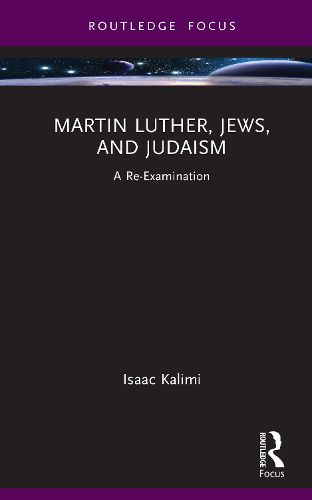Readings Newsletter
Become a Readings Member to make your shopping experience even easier.
Sign in or sign up for free!
You’re not far away from qualifying for FREE standard shipping within Australia
You’ve qualified for FREE standard shipping within Australia
The cart is loading…






This book explores Martin Luther's attitudes towards Jews and Judaism, considering his approach in the historical, religious, theological, and cultural context of late Middle Ages Europe. During his career, especially in the later stage, Luther made numerous venomous comments and wrote violently antisemitic tracts. Reflecting on these statements and writings, the book maintains that Luther's stance cannot be excused as a reaction to issues with family, health, or ageing or as an integral part of society's norms. The author argues that Luther's Judeophobia was rooted in a reading of the Old and New Testaments and in the Christian anti-Jewish tradition, education, and fundamental theological worldview on Jews and Judaism that he chose to escalate. Other factors discussed include Luther's fears of ongoing Jewish intellectual influence and "Jewish magical power," as well as his deep disappointment at the Jewish rejection of his newly reformed Church. Providing an invaluable perspective on Martin Luther's position, the book will be of interest to scholars of religion, theology, history, antisemitism, and Jewish-Christian relations.
$9.00 standard shipping within Australia
FREE standard shipping within Australia for orders over $100.00
Express & International shipping calculated at checkout
This book explores Martin Luther's attitudes towards Jews and Judaism, considering his approach in the historical, religious, theological, and cultural context of late Middle Ages Europe. During his career, especially in the later stage, Luther made numerous venomous comments and wrote violently antisemitic tracts. Reflecting on these statements and writings, the book maintains that Luther's stance cannot be excused as a reaction to issues with family, health, or ageing or as an integral part of society's norms. The author argues that Luther's Judeophobia was rooted in a reading of the Old and New Testaments and in the Christian anti-Jewish tradition, education, and fundamental theological worldview on Jews and Judaism that he chose to escalate. Other factors discussed include Luther's fears of ongoing Jewish intellectual influence and "Jewish magical power," as well as his deep disappointment at the Jewish rejection of his newly reformed Church. Providing an invaluable perspective on Martin Luther's position, the book will be of interest to scholars of religion, theology, history, antisemitism, and Jewish-Christian relations.